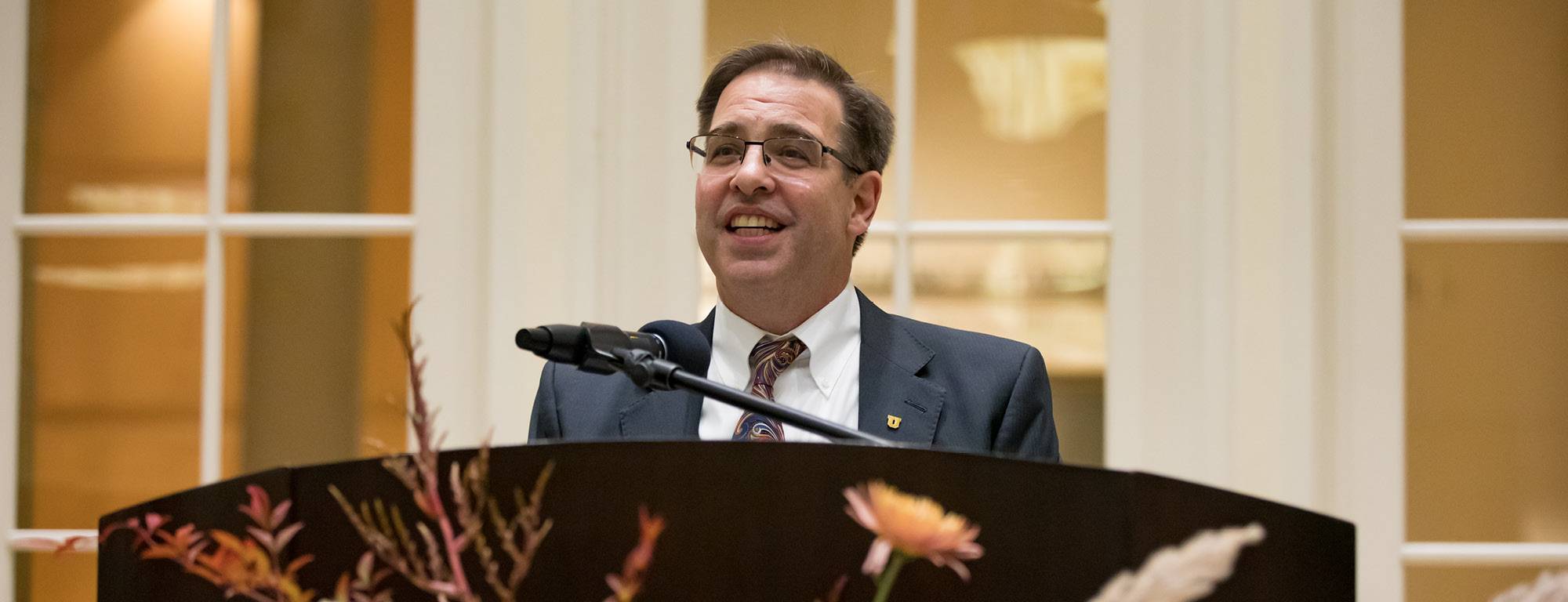After 8 years leading the School of Music,
Director Miguel Chuaqui returns to the faculty
In 2015, Dr. Miguel Chuaqui was appointed the Director of the School of Music at the University of Utah following an extensive national search. Prior to his appointment, Dr. Chuaqui had served for many years as the head of the Composition Area, and he had served as Interim Director in 2014-2015.
Most recently, Dr. Chuaqui led School of Music faculty, staff, and students through the challenges of the pandemic. With calm and creativity he established detailed and comprehensive safety plans, an online digital repository with music learning and teaching resources for students and faculty, and an online venue to livestream student performances and recitals. He utilized the time when the campus was mostly empty to update classrooms (with streaming technology and new movable desks and chairs), performance and rehearsal halls (ventilation and streaming capabilities), and practice rooms (ventilation—sorely needed in the basement practice rooms).
Before the pandemic Dr. Chuaqui secured funding and spearheaded several improvements to Music facilities, ranging in cost from $100,000 to over $500,000. These included a large Music Technology Studio, a major acoustic retrofit to the Band Room, full-spectrum LED lights in Libby Gardner Concert Hall, Dumke Recital Hall, and the Voice & Opera Center, new water fountains with filtered water, and new furniture for the student lounge, for the atrium, and for the 4th floor foyer.
During his tenure, the endowment of the School of Music increased by $10M, scholarship funding increased by 27%, and several chamber ensembles were endowed and named: a string quartet, a vocal quartet, a jazz quintet, and a brass quintet.
Dr. Chuaqui hosted 8 Camerata Awards (making an acting debut in the 2020 Camerata Awards video). These events brought in $70,000-$110,000 each year, with the most recent gala being the most successful in the School’s history. Thanks to funding from the Camerata Awards, the School of Music has been able to provide additional scholarships, substantial funding for instruments, as well as funding for ensembles and individual students to travel to present, perform, and compete nationally and internationally.
As Director, he launched over 30 faculty searches which attracted excellent candidates. In addition to their outstanding creative and scholarly achievements, new faculty members have brought new ideas and a focus on equity, diversity, and inclusion that have transformed the School of Music.
In 2016, he led the School through a Graduate Council Review and, this year, through a NASM (National Association of Schools of Music) accreditation review—both extensive and comprehensive external evaluations of the School of Music. These reviews have confirmed how successful an institution this school is, and how much potential it has to become even more successful in the future.
Dr. Chuaqui says he is proud of the new School of Music ensembles and changes to the curriculum that have been implemented, based on the School of Music Strategic Plan that was crafted in 2019-2020: the Global Music Ensemble, the Electroacoustic Ensemble, a Vocal Pedagogy masters degree, and a Music Entrepreneurship Certificate.
“As I ponder over the many extraordinary experiences of the last eight years, the one feeling that stands out for me is the joy I feel as we work together to make the School of Music an institution that brings together students and faculty, inspiring us to develop fully as performers, composers, music scholars, educators, and community engaged musicians—an institution that truly encourages us to Connect, Transform, and Transcend.
I am also proud of the resilience that our students and faculty mustered during the pandemic thanks to the great community we built together, persistently and enthusiastically making music despite the challenges.
And there are so many great things happening in the school right now. I'm thankful that I'm completing my tenure as Director having experienced all this."

